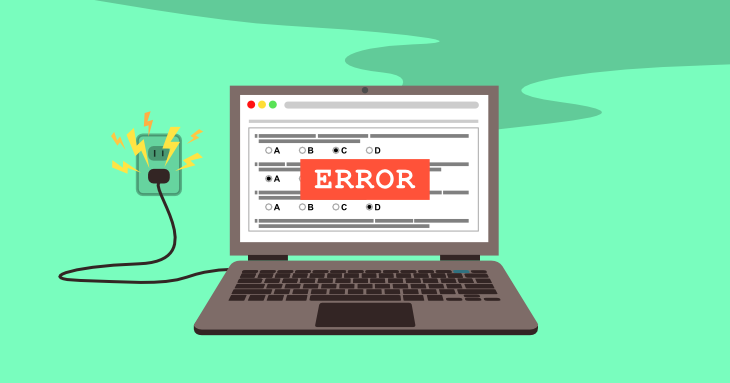Technical Issues During Online Exams

Exam season has always been stressful. With schools migrating online, exams have followed suit. Now on top of regular exam anxiety, there’s also additional stress from online testing and remote proctoring. With the added layer of technology between you and your exam, more things can go wrong. For this reason, some students feel more nervous about an online exam.
Reducing the risk of technical issues on your exam day
Writing a test online can feel weird, especially if it’s your first time. Unfortunately higher levels of stress can negatively impact your exam performance. Therefore, it’s wise to be prepared for potential stressors that come with virtual exams.
Tech Anxiety
One of the biggest downsides of taking exams online is its reliance on technology. If you’ve ever dealt with IT issues before, you would know that they’re incredibly annoying to deal with. It’s even more frustrating when your exam is at stake.
Virtual proctors or exam delivery systems can experience technical issues of their own, and that is unavoidable. However, between the exam platform and you, it’s far more likely that the technical issues would come from your end. Even then, the chance of IT issues can be minimized with preparation and equipment testing ahead of time.
Preparation
A few weeks before your exam, read through the instructions provided. Online exams often provide instructions on what to do prior to and on your scheduled exam date. A few weeks may seem unnecessary but if you discover that your IT setup is insufficient, you will want that extra time to get your workspace in order.
Common IT requirements for online exams include:
- fast internet (preferably wired)
- no separate monitors
- no remote connection
- no virtual machines
- webcam
- microphone
- proctoring software installed ahead of time
- browser requirements
- operating system requirements
- RAM requirements
- screen resolution requirements
- CPU requirements
- administrator permissions
Clearly, there’s a lot of requirements to review and it’s easy to miss something. Dedicate some time to go through the instructions, it could potentially save you a lot of stress down the road.
Some exam platforms offer a one-click equipment check. If your exam platform offers this feature, be sure to take advantage of it. While these tests do not guarantee a smooth exam day, they do a decent job of flagging potential insufficiencies in your setup.
On the day of your exam, restart your computer. In fact, it’s good practice to reboot your machine regularly. This frees up memory space, clears temporary files, and can improve performance.
What if technical issues happen during the online exam?
Exam platforms often come with fail-safe designs. For example, some platforms auto-save answers as you write. Thus even if you disconnect without submitting, your answers are saved. That being said, it’s still good practice to save your work regularly.
Some systems also employ various protocols in the event of an IT issue. For instance, some institutions allow you to complete the remainder of your exam offline. Other institutions may require you to re-write your exam in another sitting.
Each institution runs differently so check with your exam issuer ahead of time for their procedures.
If technical issues do arise during your exam, it’s not the end of the world. Technical issues are a part of our modern lives now and can happen at the worst times. The best we can do is flag potential issues ahead of time and prepare accordingly.
